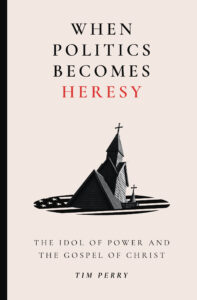
With election season upon us, Lexham Press is sharing some adapted portions from Tim Perry’s upcoming When Politics Becomes Heresy: The Idol of Power and the Gospel of Christ. In this book, Perry identifies ways that evangelicals are falling into “heretical logic” by exchanging the heavenly eternal realities of the Gospel for earthly and temporal political goals. In the post below, Perry summarizes three classic heresies and their modern outworking when evangelical Christians seek political power.
Evangelical Simony
When the Bible is deployed to speak immediately to a modern political matter, as though there is absolutely no room for reflection or disagreement, be on the alert for Simony. When the Bible is misused to make difficult and complex issues seem easy, it is being used to browbeat faithful people into coming to a solution prematurely. It is deploying the language of faith to secure a position in politics. It is Simony.
Far too many evangelical Christians have agreed, in spite of their rich interior devotional lives, that political power is the only power that matters. They go on to affirm that, if the faith is to remain relevant in the public square, it will have to purchase a claim on that power. What they have failed to do is count the cost. The cost is high: putting the faith’s own language and practice to political service. Thus both from the right and the left, like Simon approaching Peter, far too many of us are approaching the high priests of the new post-Christian religions of the West begging for continued relevance.
Evangelical Gnosticism
There are significant parallels between the days of the Christian Gnostics and the late modern West. We sought to bring Jesus to a culture by closing the gap between the two as much as possible. Like the Gnostics, we ended up adopting the culture, losing Jesus, and scorning our own piety.
The Gnostic Christians may well have been secretive about their rituals, but their beliefs were surprisingly mainstream. We read them wrongly if we read them as masters of esoterica. They were Christians in some sense. They believed that they had encountered in Jesus the Savior of the world. And they took it upon themselves to minimize the distance between Jesus and their world as much as possible. If we are to understand just how ancient Gnostics help us see how at least parts of evangelicalism have gone off the rails, we need to understand them as (finally heretical) Christian apologists.
Evangelical Arianism
An Arian Christology is preaching and spiritual formation that puts Jesus to work serving this or that political issue, which is believed for other, more important reasons. The Arian Jesus is a cheerleader for securing the border or opening it, for constraining abortion access or widening it, for banning guns or buying them. Pick a hot-button political issue and you will find someone insisting Jesus is exclusively on their side. But Jesus is not a creature; he is not of this world. His gospel is not a message about how to build a kingdom. His gospel is that in his vicarious life, death and resurrection, he—the God-man—has delivered us from the unholy reign of sin, death, and the devil. Oh, he is a king, and his kingdom is breaking in all around us. But it’s his kingdom, not ours. It is not of this world. Unsurprisingly, this is merely a reiteration of the charge made with respect to the Bible in chapter 2. Like the Scriptures that testify to him, the Arian Jesus is a wax nose twisted this way and that to support political positions that he never addressed in the Gospels and of which the Scriptures that testify to him know nothing directly. He is a “a noneschatological, present-tense, this-world-affirming Jesus,” who’s entirely beholden to opposed ideologies.
We are on the threshold of a choice with grave consequences. If we subsume the gospel to politics and make the good news of salvation a mere addendum, we will lose Jesus as surely as Arius did.
This post was adapted from When Politics Becomes Heresy: The Idol of Power and the Gospel of Christ by Tim Perry (Lexham Press, 2025).







